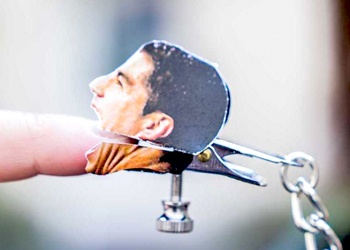 Beijing, Jul 6: Chinese online stores are cheekily trying to cash in on Uruguay striker Luis Suarez's notorious bite of an opponent at the World Cup by selling bottle openers with his image.
Beijing, Jul 6: Chinese online stores are cheekily trying to cash in on Uruguay striker Luis Suarez's notorious bite of an opponent at the World Cup by selling bottle openers with his image.
Liverpool forward Suarez was given a four month ban from football for sinking his teeth into Italy defender Giorgio Chiellini during their final group match in Brazil last month.
He was also suspended for nine internationals and fined 100,000 Swiss francs (112,000 dollars) for what was his third offence of biting an opposition player.
Popular Chinese retail website Taobao has retailers offering bottle openers in a cartoon image of Suarez, looking angry with his mouth wide open, for 16.80 yuan ($2.70).
The China Daily newspaper reported that the products were proving popular.
"I came up with the idea the night I watched the game and saw the bite," Wang Lin, who owns an e-shop on Taobao.com, told the paper.
"It has been a good sales idea, the only problem being that the manufacturing process cannot keep up with demand," he added.
The bottle openers are not the first fun response to Suarez's bite -- an online Swedish sex shop unveiled a "Suarez nipple clamp" in the form of the footballer's head, teeth bared, for 33 euros ($45).
Uruguay have lodged an appeal against the ban on Suarez who later apologised for his actions.





Comments
What is the most astounding reality?
Also visit my website Recreational Weed Seattle (Marianne: http://1001raketka.ru/bitrix/redirect.php?event1=&event2=&event3=&goto=…)
Add new comment